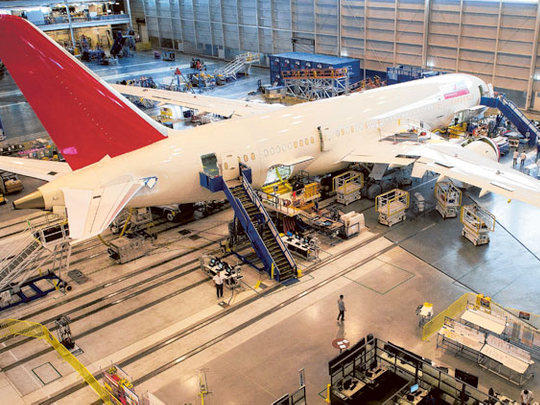
Washington: Boeing has proposed a fix for battery problems on the 787 Dreamliner but the aircraft will stay grounded worldwide until a safe solution is determined, US air safety regulators said on Friday.
“The FAA is reviewing a Boeing proposal and will analyse it closely,” the Federal Aviation Administration said after meeting with senior Boeing executives to discuss the ongoing investigation of the battery issues.
“The safety of the flying public is our top priority and we won’t allow the 787 to return to commercial service until we’re confident that any proposed solution has addressed the battery failure risks.”
Boeing earlier said that Ray Conner, the head of Boeing Commercial Aeroplanes, had a “productive meeting” with FAA chief Michael Huerta in Washington to discuss the lithium-ion battery issues on the cutting-edge plane that is key to the company’s growth strategy.
“We are encouraged by the progress being made toward resolving the issue and returning the 787 to flight for our customers and their passengers around the world,” a Boeing spokesman said.
All 50 of the 787s in service have been grounded for more than five weeks, disrupting airline schedules, as US and foreign investigators try to pinpoint the cause of a battery fire on a parked plane and a battery smoke incident that forced another into an emergency landing.
While Boeing claims progress in the probe, the extent of the problems and the potential complexity in addressing them remains unknown, triggering mounting speculation on how long the groundings will last.
Neither the FAA nor Boeing offered any details on the battery proposal.
Aviation expert Richard Aboulafia of the Teal Group said that if the FAA accepted the Boeing fix, the 787 could be flying again in April, but he added: “There’s a very good chance that they won’t.”
“We don’t know to what extent it is a temporary fix and if it is accompanied by a broader solution that’s not going to work as a long-term fix,” he said.
“The FAA is talking about zero tolerance.”
Boeing said it was working around the clock with teams of hundreds of experts on the issue and working closely with the FAA and other authorities.
“We greatly appreciate all the resources that have been dedicated to this effort across the FAA by administrator Huerta,” the spokesman said.
The New York Times reported this week that Boeing had zeroed in on how lithium-ion batteries could fail and concluded they would be safe to use after making changes, such as adding insulation between the battery cells.
Boeing halted 787 deliveries shortly after the planes were grounded on January 16 but continued to produce 787s at a rate of five per month.
Airlines flying the fuel-efficient plane have been forced to cancel flights and rearrange schedules due to the groundings, while postponed deliveries have put strains on waiting customers.
On Thursday, United Airlines said it was taking its six Boeing 787s out of service through June 5, except to launch a Denver-Tokyo route on May 12 if circumstances allowed.
Last week, Boeing’s European arch-rival Airbus said it decided to drop lithium-ion batteries planned for the new A350 aircraft it is developing and use heavier nickel-cadmium batteries instead.











